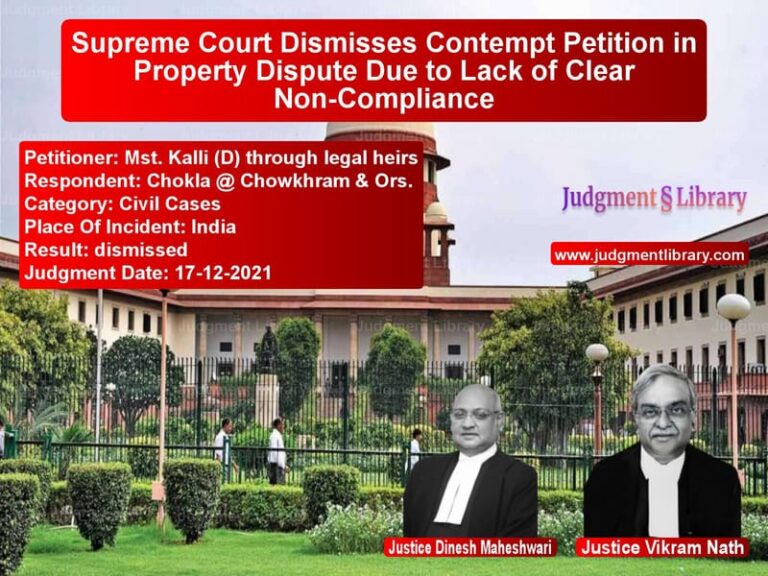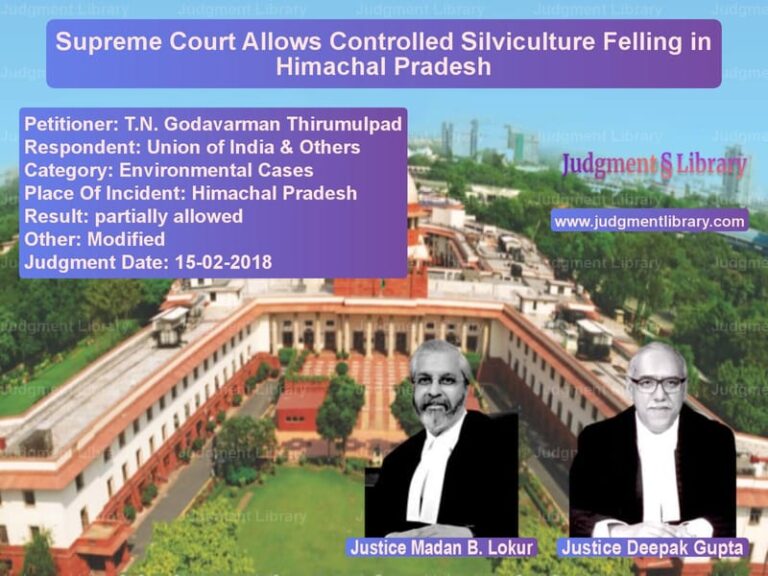Securities and Exchange Board of India vs. Opee Stock-Link Ltd.: SEBI’s Authority in Preventing Stock Market Manipulation
The Supreme Court of India recently delivered a significant judgment in the case of Securities and Exchange Board of India (SEBI) vs. M/s. Opee Stock-Link Ltd. This case highlights the critical role of SEBI in ensuring the fairness of stock markets, protecting retail investors, and preventing fraudulent practices in Initial Public Offerings (IPOs).
Background of the Case
The case revolves around SEBI’s actions against stock market manipulation in IPOs of companies like Jet Airways India Limited and Infrastructure Development Finance Company Limited. SEBI discovered that several irregularities occurred during the share allocation process, particularly in the retail investor category. These irregularities involved the misuse of multiple demat accounts to corner shares meant for retail individual investors (RIIs), thereby preventing fair distribution.
Arguments by the Petitioner (SEBI)
SEBI contended that hundreds of benami demat accounts were used to corner shares meant for RIIs. These shares were then transferred to select entities at below-market prices before being sold at higher rates, leading to unfair gains.
SEBI’s argument was based on the violation of:
- Section 12A (a), (b), (c) of the SEBI Act, 1992
- Regulations 3 and 4(1) of the SEBI (Prohibition of Fraudulent and Unfair Trade Practices) Regulations, 2003
SEBI’s investigation revealed that a significant number of shares were allotted to retail investors who had common addresses, lacked trading accounts, or had questionable credentials. These shares were then sold in bulk transactions, indicating a pre-planned strategy to manipulate the IPO market.
Arguments by the Respondents
The respondents challenged SEBI’s findings, arguing:
- That all transactions were legitimate and conducted as per standard market practices.
- That the alleged retail investors were genuine individuals making independent trading decisions.
- That there was no proof that they engaged in any fraudulent activities.
- That SEBI had no complaints from any retail investors regarding being deprived of shares.
Additionally, the respondents claimed that selling shares at a fixed price before listing was a normal stock market activity and did not constitute an illegal act.
Key Observations by the Court
The Supreme Court analyzed SEBI’s evidence, particularly the patterns in the demat accounts and transactions. The court observed:
- Many demat account holders had provided the same address, indicating the likelihood of benami or fictitious accounts.
- The investors sold their shares at a fixed price of Rs.1170 per share, despite market variations, which was suspicious.
- Retail investors normally do not sell their shares in bulk to a single entity at below-market prices.
- Several accounts were closed immediately after the transactions, suggesting they were created solely for the purpose of cornering shares.
The court also emphasized SEBI’s duty to act proactively, stating:
“If from its independent sources, SEBI, after due inquiry, comes to know about some illegality or irregularity, SEBI has to act in the manner as it acted in the instant case.”
Final Judgment
The Supreme Court ruled in favor of SEBI, stating that the SAT (Securities Appellate Tribunal) had erred in reversing SEBI’s findings. The court reinstated SEBI’s order, stating that:
- The transactions were fraudulent and violated SEBI regulations.
- The respondents engaged in unfair trade practices to gain an undue advantage.
- Market manipulation in IPO allocations directly harms retail investors.
- The SEBI orders should be reinstated, and penalties should be enforced within two months.
Thus, the Supreme Court quashed the SAT’s decision and upheld SEBI’s authority to regulate stock markets effectively.
Significance of the Judgment
This judgment is a landmark decision reinforcing SEBI’s power to take strict action against market manipulators. It sends a strong message that fraudulent activities in IPOs will not be tolerated. The ruling ensures:
- Protection of retail investors from unfair market practices.
- Increased transparency in IPO allotments.
- SEBI’s proactive role in preventing stock market fraud.
The judgment also highlights the importance of maintaining investor confidence in the stock market by eliminating unfair practices.
Conclusion
The Supreme Court’s decision in the SEBI vs. Opee Stock-Link Ltd. case is a crucial step toward ensuring stock market integrity. By upholding SEBI’s findings, the court has reinforced regulatory mechanisms to prevent unfair trade practices and protect retail investors. This ruling serves as a benchmark for future cases concerning stock market fraud and strengthens the regulatory framework governing India’s financial markets.
Don’t miss out on the full details! Download the complete judgment in PDF format below and gain valuable insights instantly!
Download Judgment: Securities and Excha vs Ms. Opee Stock-Link Supreme Court of India Judgment Dated 11-07-2016-1741873164613.pdf
Direct Downlaod Judgment: Direct downlaod this Judgment
See all petitions in Company Law
See all petitions in Corporate Governance
See all petitions in Shareholder Disputes
See all petitions in Corporate Compliance
See all petitions in Judgment by Anil R. Dave
See all petitions in Judgment by R. Banumathi
See all petitions in allowed
See all petitions in supreme court of India judgments July 2016
See all petitions in 2016 judgments
See all posts in Corporate and Commercial Cases Category
See all allowed petitions in Corporate and Commercial Cases Category
See all Dismissed petitions in Corporate and Commercial Cases Category
See all partially allowed petitions in Corporate and Commercial Cases Category







